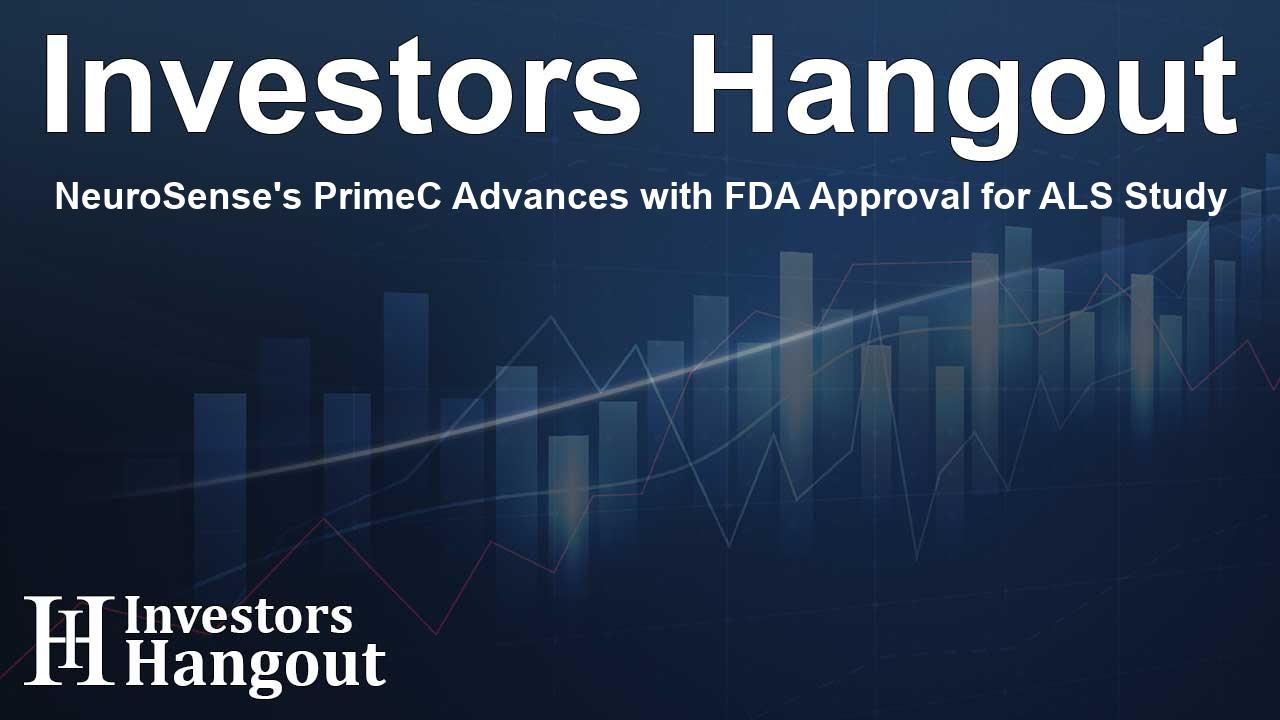NeuroSense's PrimeC Advances with FDA Approval for ALS Study

NeuroSense Gains FDA Approval for PrimeC Phase 3 Study
The recent Type C meeting with the U.S. Food and Drug Administration (FDA) has positioned NeuroSense Therapeutics Ltd. (NASDAQ: NRSN) on a promising path to initiate its Phase 3 clinical study for PrimeC in the treatment of amyotrophic lateral sclerosis (ALS) by mid-2025. Coupled with the positive outcomes from the 18-month Phase 2b PARADIGM study, NeuroSense is poised for advancing its innovative ALS therapy.
PrimeC Shows Remarkable Efficacy in ALS Treatment
PrimeC remains the cornerstone of NeuroSense's drug development efforts, demonstrating a remarkable ability to slow disease progression and improve survival rates for those suffering from ALS. The recent FDA review reflects this sentiment, acknowledging the potential of PrimeC as a viable therapeutic option for patients in urgent need of effective treatments.
Details of the Phase 3 Clinical Study
Following the productive dialogue with the FDA, NeuroSense plans to present a detailed final protocol for the Phase 3 study within the first half of 2025. The study aims to enroll about 300 participants, who will be divided into a 2:1 ratio of PrimeC to placebo. This pivotal study is characterized as randomized, multi-center, multinational, prospective, double-blind, and placebo-controlled. It will also feature an open-label extension (OLE) phase, allowing all participants to receive PrimeC following 12 months of treatment.
Importance of FDA Feedback
The FDA's constructive feedback and guidance regarding the trial's design are significant milestones in NeuroSense's drug development program. This alignment is crucial for meeting regulatory expectations and acquiring sufficient data for potential approval of the drug.
NeuroSense's Commitment to ALS Research
CEO Alon Ben-Noon expressed enthusiasm about the mutual understanding achieved with the FDA, emphasizing the importance of this phase in the broader scope of drug development. He stated, "This feedback validates our progress and reinforces our dedication to delivering viable therapeutic options for ALS patients, whose needs are pressing. Our goal is to bring much-needed solutions to this underserved community."
Understanding ALS and its Global Impact
Amyotrophic lateral sclerosis (ALS) is a devastating neurodegenerative disease that leads to total paralysis and ultimately, death, generally within two to five years after diagnosis. Each year, over 5,000 new ALS cases emerge in the U.S., representing a substantial health burden, with costs exceeding $1 billion annually. Projections suggest a 24% increase in ALS cases by 2040 in the U.S. and EU.
Insights from the PARADIGM Study
NeuroSense's previously completed PARADIGM trial was a substantial, multinational investigation into the efficacy of PrimeC. The double-blind, placebo-controlled Phase 2b study engaged participants from various countries, including 68 individuals living with ALS. Remarkably, even in conjunction with Riluzole, the standard ALS treatment, PrimeC had a notably positive effect on slowing disease progression.
What Makes PrimeC Unique?
What sets PrimeC apart is its innovative formulation as a fixed-dose combination of two FDA-approved drugs: ciprofloxacin and celecoxib. This extended-release oral treatment targets critical pathways involved in ALS, such as inflammation and motor neuron degeneration. Insights from earlier trials highlighted its ability to reduce deterioration in function and respiratory capabilities, marking it as a drug with biological efficacy.
About NeuroSense
NeuroSense Therapeutics Ltd. concentrates on developing innovative treatments for patients facing challenging neurodegenerative conditions like ALS, Alzheimer's, and Parkinson's disease. The company recognizes the enormity of the unmet medical needs in these areas and aims to develop combined therapies that interact with multiple mechanisms contributing to neurodegeneration.
Frequently Asked Questions
What is PrimeC and how does it work?
PrimeC is an oral drug candidate combining two FDA-approved medications, designed to slow the progression of ALS by targeting various pathways affecting motor neuron health.
What feedback did NeuroSense receive from the FDA?
The FDA provided positive feedback on the trial design for the Phase 3 study, indicating alignment with regulatory expectations necessary for potential approval.
When is the Phase 3 study expected to begin?
NeuroSense is set to commence enrollment for the Phase 3 study around mid-2025, with protocol submission scheduled for the first half of 2025.
What is ALS and its significance?
ALS is a severe neurodegenerative condition resulting in paralysis and high mortality rates, with thousands diagnosed each year, underscoring a significant health crisis.
How did the PARADIGM study contribute to the understanding of PrimeC?
The PARADIGM trial demonstrated PrimeC's effectiveness in slowing ALS progression, providing critical data that supports its advancement to Phase 3 trials.
About The Author
Contact Hannah Lewis privately here. Or send an email with ATTN: Hannah Lewis as the subject to contact@investorshangout.com.
About Investors Hangout
Investors Hangout is a leading online stock forum for financial discussion and learning, offering a wide range of free tools and resources. It draws in traders of all levels, who exchange market knowledge, investigate trading tactics, and keep an eye on industry developments in real time. Featuring financial articles, stock message boards, quotes, charts, company profiles, and live news updates. Through cooperative learning and a wealth of informational resources, it helps users from novices creating their first portfolios to experts honing their techniques. Join Investors Hangout today: https://investorshangout.com/
The content of this article is based on factual, publicly available information and does not represent legal, financial, or investment advice. Investors Hangout does not offer financial advice, and the author is not a licensed financial advisor. Consult a qualified advisor before making any financial or investment decisions based on this article. This article should not be considered advice to purchase, sell, or hold any securities or other investments. If any of the material provided here is inaccurate, please contact us for corrections.
